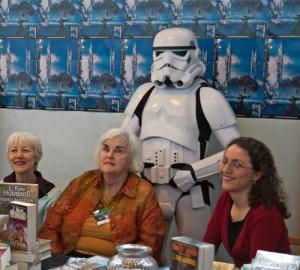As you may already know, when I found Babylon 5 I also found its creator J. Michael Straczynski.
I did get to meet him almost 10 years ago at Phoenix Comicon, at the 20th anniversary celebration for Babylon 5 (B5), where I attended the “Promise Panel”, where he told, for the first time in public, the background story of Michael O’Hare who played the lead, Commander Sinclair, in the first season, and his struggle with mental illness.
If you don’t know the story, and want to, just go on Youtube and search “straczynski promise panel”. Please be aware that this contains spoilers for the B5 series if you have not seen it.
Having followed him for quite a while, I know a bit about his writing career.
He has worked as a journalist, writing for much else:
- animated TV, like The Real Ghostbusters long ago
- Live TV, like Jeremiah and, of course his epic science fiction series Babylon 5. There is a new secret Babylon 5 related project, not known in which format, but it has been made and should be presented at the San Diego Comicon next year. Then there is the possibility of a reboot series of Babylon 5, not a remake but a re-imagining. This could be very interesting if it is given the green light. Then there is the Neflix series Sense8 that he co-wrote with the Wachowskis
- Comic books like Superman Earth One, Spiderman, and some originals of his own
- Film, like the Clint Eastwood directed Changeling, a historical drama
- Novels, both genre and more general
- He also wrote an autobiography
I have had the wish to meet Straczynski in Europe after he was involved in Sense8, so I did not have to go to the US to do it.
I, and others, have suggested to invite him to Fedcon in Bonn, but for some reason unknown to me, it did not happen.
Today I saw an announcement from the Danish book fair (Bogforum) that they are going to have Straczynski as a guest at this year’s fair in Copenhagen in November this year. I also saw the announcement by Straczynski himself on his Twitter feed.
Now my wish comes true. Straczynski visiting, not just Europe, but within 20 minutes drive from my home.
I am excited.

